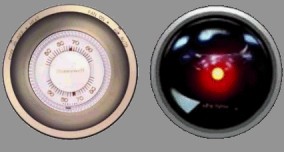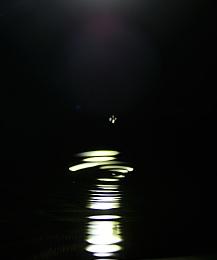 oday I'm going to do a thought experiment. Let's suppose, just for the sake of argument,
that there is such a thing as life after death. How would that work?
oday I'm going to do a thought experiment. Let's suppose, just for the sake of argument,
that there is such a thing as life after death. How would that work?
Before we start, we should dispose of two questions. One is whether eternal life is desirable. Unfortunately, we're not going to get a choice here. The question of whether flying around with wings playing harps for 311.04 trillion years will be enjoyable is irrelevant: if it happens, you will play the harp und you will enjoy it!
Then there's the religious objection. Religious people protest that if there's no afterlife and no hell, there can be no justice. That may or may not be true, but it has no bearing on whether something is true, so we will ignore that objection for now.

A Honeywell thermostat and the much more complicated thermostat HAL-9000 from the movie 2001. Sometimes the older technology works better.
At right is a slide from a lecture I gave on the subject a few years ago. We often view humans and inanimate objects in a hierarchy like this:
Humans > Animals > Calculators > Thermostats
What is the fundamental difference between a person, a HAL-9000 computer, and a thermostat?
David Chalmers, in his book The Conscious Mind: In Search of a Fundamental Theory, said that conscious experience is not logically deducible from physical phenomena, and therefore consciousness cannot be reduced to or explained by physical phenomena:
Given any ... [physical] process, it is conceptually coherent that it could be instantiated in the absence of experience. It follows that no mere account of the physical process will tell us why experience arises. The emergence of experience goes beyond what can be derived from physical theory.
Nailing down terms like ‘experience’ is essential. Thomas Clark pointed out that Western society is biased by Cartesian intuitions about the ontological divide between the mental and physical, so our terminology reinforces our prejudices in favor of a dualistic approach. Others have pointed out that assuming that only humans have consciousness is anthropocentric. Phrasing the definition of consciousness as Nagel did as “what it is like to be something” predisposes us to answer in terms of human experience.
The cold and lonely life of the thermostat
Everyone knows how a thermostat works: it takes information from the environment and makes a yes/no decision depending on whether the temperature is above or below a threshold value.
If we asked what it's like to be a thermostat, it would be hard to answer. But what fundamental difference is there between a thermostat and a neuron in the brain? Both make measurements, process information, and send an output signal. So in some sense the thermostat could be said to be conscious of the temperature. We could imagine that it might even have a rudimentary subjective component. So, provided we got approval from the TPUC (Thermostat Protection and Use Committee), we could use thermostats as a model to study how information and subjectivity relate to each other.
Maybe subjectivity is a property of information itself, or of how information changes over time, and only in a functioning brain does its subjective component obtain awareness. If so, it means that there is a dualism to information. It also means that subjectivity is separate from perception, awareness, and brain function.
Life after death

Water droplet falling back into a pond
Anyway, getting back to the original question. What would we need for consciousness to continue after death? We need to define consciousness first. Here's one definition:
- A way to receive information about the outside world
- A way to get information about what we're thinking
- Some mechanism for memory storage and retrieval
- A way to process information logically and make abstract deductions and associations
The universe can't do abstraction or association, but it does have the other three elements in our list. Memories are stored in the universe as physical changes, just as they are in our brains. If one star smashes into another, that information is remembered as the physical changes that persist afterward. It might not be life as we know it—in fact, it's more like a mirror image of it—but we can't say it doesn't have subjectivity.
Physicists tell us that information can never be destroyed. If subjectivity is a property of information, it follows that subjectivity must continue in some form after death. We could speculate that our subjectivity returns to a vast ocean of subjectivity that is in the universe. Everything that made us unique—our localization in time and space, our personality, and our memories—might be erased. But we would continue, albeit with no awareness, memory, emotion, or individuality.
But there's a catch. The conclusion is inescapable: if humans have an afterlife, so do calculators and thermostats. If there's a heaven, they'll be up there with us.* Those 311 trillion years might not pass quickly, but at least we'll be warm, and we'll be able to do some calculations.
* “Where do all the calculators go?” and the idea of Silicon Heaven were repeated themes in the TV show Red Dwarf.
dec 03, 2017, 5:46 am
